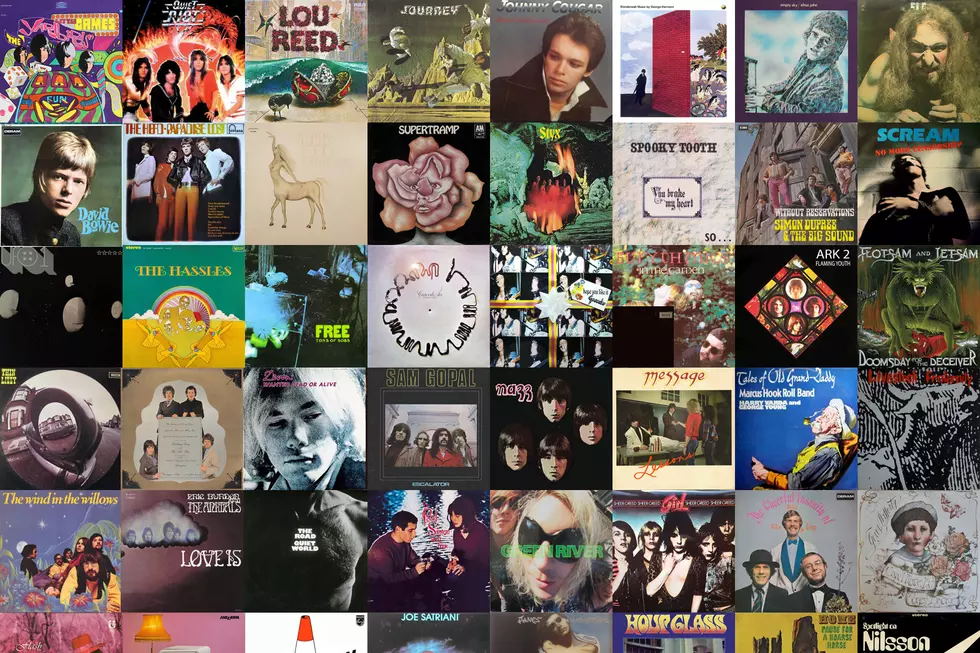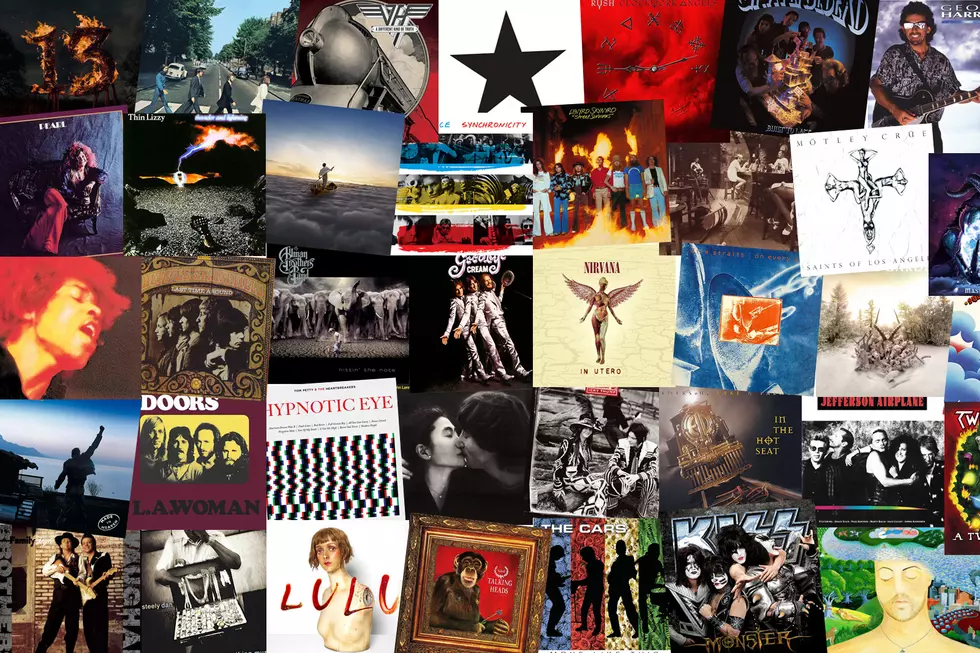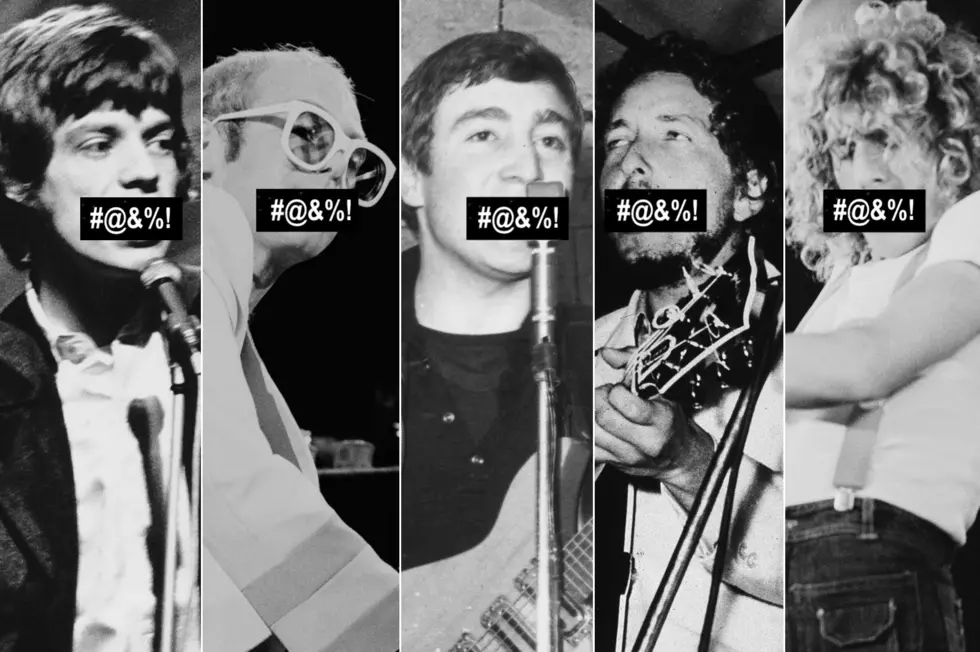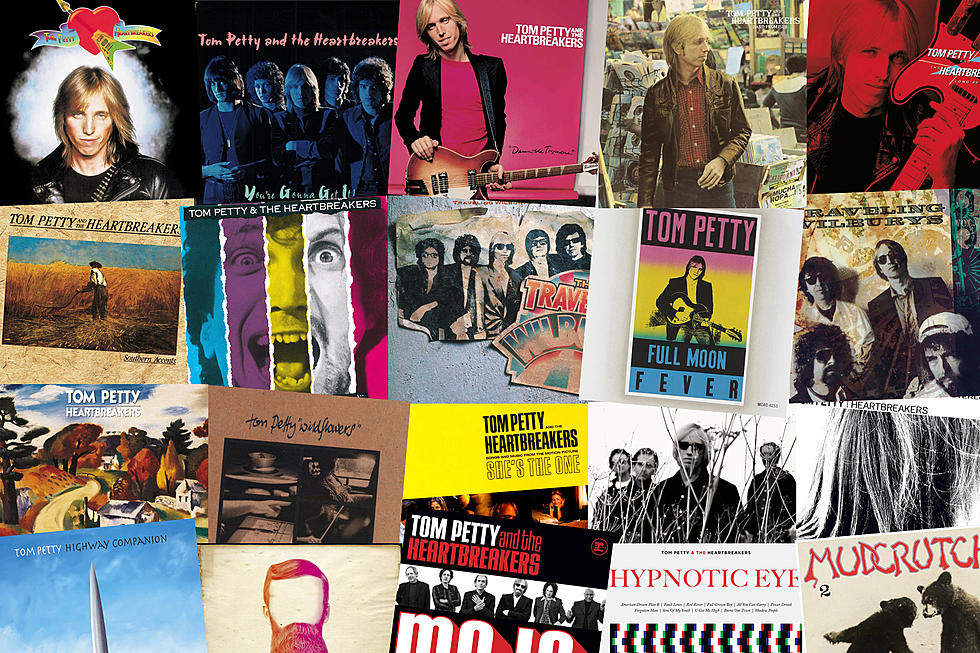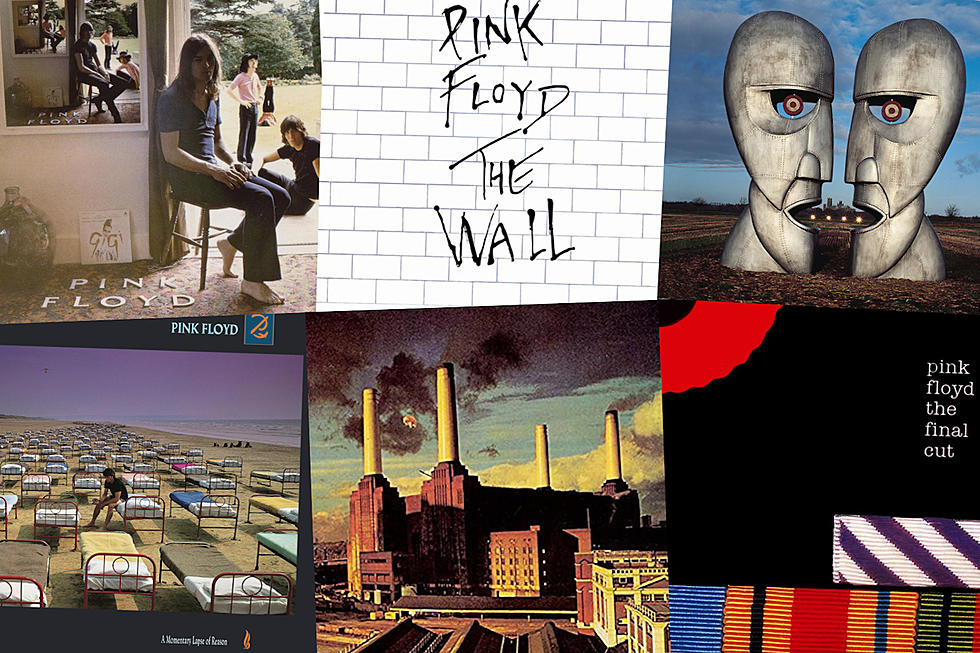
Pink Floyd: Last Great, Last Good, First Bad Album Roundtable
It's weird to think that Pink Floyd released six albums between their debut LP, The Piper at the Gates of Dawn, and the unimpeachable The Dark Side of the Moon.
Between these obvious creative poles, the band searched for direction after the exit of their original leader Syd Barrett: experimenting with orchestrations (Atom Heart Mother), scoring films (More), and even recording solo pieces on a single album (Ummagumma). These guys have recorded some of the greatest rock music ever — but they've also made a lot of filler.
That's what makes their catalog a perfect choice for our latest roundtable. Read on below as five UCR contributors debate the band's last great, last good and first bad album.
1) What was the last great Pink Floyd album?
Michael Gallucci: The Wall is the last album where they sound like a band, rather than a solo vehicle for Roger Waters (The Final Cut) or David Gilmour and some session guys (the post-Waters LPs). More importantly, it's the last album by the key lineup where the music isn't weighed down by a heavy-handed concept.
Allison Rapp: I really think The Wall was the last time everyone was on the same page, or at least awful close to it — physically as a quartet, but also emotionally. Crafting a concept album of that length and stature takes a lot of guts and interpersonal communication among band members, and it seems The Wall was the last time Pink Floyd was able to achieve that level of mutual artistic understanding. Barrett would have been proud.
Ryan Reed: The Wall. Technically Roger Waters stuck around for one more Pink Floyd LP, The Final Cut — but that album, despite its pristine production and seamlessly executed concept, lacks the full-band synergy that still lingered on its predecessor. Like on Final Cut, Waters dominates The Wall, but Gilmour's touch defines most of the centerpiece tracks: the tightly coiled disco-rock of "Another Brick in the Wall (Part 2)," the grinding hard rock of "Young Lust," the sublime narcotic swirl of "Comfortably Numb."
Nick DeRiso: Animals. Pink Floyd pushes back — and hard — against the looming, punk-driven idea that they had grown soft into middle age. Today, it's clear that Animals also represents the first stirrings of Waters' more political bent — one that would dominate his recordings past his association with the group he co-founded. The Wall became Waters' most personal album, his greatest individual triumph — but also the stone that dragged Pink Floyd down.
Corey Irwin: Maybe my standards are too high, but to be “great” I believe an album must be among the essential releases of a band’s catalog. The Wall was the final LP in an impressive quartet of albums - following The Dark Side of the Moon (1973), Wish You Were Here (1975) and Animals (1977). It remains one of rock's signature albums. Nothing that followed came close to matching its greatness.
2) What was the last good Pink Floyd album?
Gallucci: The Final Cut isn't terrible — it just doesn't sound much like a Pink Floyd album. And as far as Waters' solo albums go, it's better than most. But it also seems like the endgame for all those records that culminated in The Wall: big, heavy conceptual works that make sense only as a total piece.
Rapp: There are some cool gems on Obscured by Clouds, like "Wot's ... Uh the Deal?" and "The Gold It's in the ... ." It's certainly not an astounding record — it jumps around quite a bit stylistically — but it's a good setup for their next couple of albums. It was as if they used Obscured By Clouds to work out just a couple of last kinks before really hitting their stride through the ‘70s. Everything in the golden era between The Dark Side of the Moon and The Wall ranks as not just good but great, and after that, nothing else really seemed to stick.
Reed: The Division Bell lacks the edge and distinct voice of the Waters era, but it proved Gilmour could successfully carry the band into a new era. With Richard Wright now fully integrated back into the lineup (even co-writing several tracks and singing lead on one, "Wearing the Inside Out"), they sounded closer to a legit band — recreating the widescreen sound (if not quite the quality) of LPs like Wish You Were Here.
DeRiso: The Division Bell, a long, slow exhale after the novelization of Pink Floyd on The Wall and The Final Cut. Sure, the songs, written without the Waters, often weren't as narratively strong. But with Gilmour, Wright and Nick Mason each finally making important musical contributions again, Division Bell nonetheless emerged as Pink Floyd's clearest group effort since perhaps Wish You Were Here.
Irwin: The Division Bell had some promise. Of the Roger Waters-less releases, this was Pink Floyd’s strongest. We got a return to psych-rock, as well as a true collaborative effort (unlike 1987’s David Gilmour solo album pretending to be a Pink Floyd LP, A Momentary Lapse of Reason). “Lost For Words” and “High Hopes” were underrated gems, while “What Do You Want From Me” offered some of the band’s most searing lyrics in decades. Division Bell by no means compared to the band’s greatest works, but it also doesn’t deserve the criticism it’s received.
3) What was the first bad Pink Floyd album?
Gallucci: Granted, their third album, More, came out during one of the band's many transitional periods, but with Syd Barrett totally out of the picture this time around, Pink Floyd seems to be grasping for some sorta direction. The fact that More doubles as a soundtrack album for a movie few people have seen doesn't help. Many of the songs sound unfinished and aimless.
Rapp: Ummagumma makes very little sense to me, not that Pink Floyd ever particularly valued doing things by the book. But there's just so much happening at once and not in a good way. More does not always mean better. Neither does longer.
Reed: I'm not a More hater like many Pink Floyd fans — I enjoy the psychedelic spy theme atmosphere of "Title Theme," the unleashed heavy rock mayhem of "Ibiza Bar" and Gilmour's hazy folk lullaby "Green Is the Colour." But as a front-to-back album, the soundtrack often feels aimless, and there isn't a single "classic" song to be found. Without the visual accompaniment, we should grade on a curve — but no matter how you slice it, it's hard to rank More above the other post-Barrett/pre-Meddle records. (I'm giving the edge to Ummagumma, which has some killer live material on the first side.)
DeRiso: Ummagumma. Pink Floyd wasn't quick to discover a post-Syd Barrett direction. Here, they settled on the idea of presenting solo material — and that only served to illustrate the concept of a sum being greater than its parts. Gilmour later admitted he "just bullshitted" through his piece. Really, they all did.
Irwin: I hate labeling an album “bad,” especially since any release inevitably influences the material that follows it. Still, for the sake of argument, I’ll go with 1987’s A Momentary Lapse of Reason. From the bloated guest-star list to Gilmour’s domination over the songs, it all just felt so unnecessary. The material was uninspired and lacked the depth fans had come to expect from the group. It’s not a shock that Pink Floyd’s first LP without Waters was subpar, but the degree of falloff was substantial.
4) Which Pink Floyd album just missed being good?
Gallucci: Is it cheating to say The Final Cut again? "Not Now John" is the only song Waters didn't write by himself; Gilmour is given co-writer credit and sings the song. And it's one of the best on the album. Had Waters given more space to his bandmates here, The Final Cut could have been a proper follow-up to The Wall.
Rapp: The Final Cut misses the mark for me. The palpable cohesion stretching from The Dark Side of the Moon to The Wall just doesn't seem as present. There are several fantastic tracks — "The Gunner's Dream," "Your Possible Pasts" — but the fact that this was essentially a Waters solo album with guest appearances from the other members sort of dampens the whole mood. They may have labeled it as a Pink Floyd album, but it doesn't sound like a whole band endeavor.
Reed: The jokes write themselves, but A Momentary Lapse of Reason still feels like an appropriate title for Pink Floyd's first post-Waters LP. Instead of trying to soundtrack deep space, Gilmour and Mason (with Wright as a guest contributor) aimed for the expanse of stadiums — with hit-or-miss results. The production is sterile and suffocating, and Waters' signature darkness is missed. But the album's recent remix drastically improved these songs, bringing new life to the percussive "One Slip" and Hammond-heavy "The Dogs of War."
DeRiso: The Final Cut. By this point, Wright was already out the door, and Gilmour clearly didn't feel like fighting anymore. He had only one vocal and a few bursts of guitar brilliance. The rest was Waters, who unleashes a series of searing diatribes on the kind of conflicts that tore his family apart — but without the magisterial musical accompaniment that used to give them flight.
Irwin: There’s a lot of weirdness to Meddle, thanks to the experimental nature of its creation. The band pushed the boundaries of structures, sounds, tempos, chords and just about any other song characteristic you can think of. It was very much a throw-at-the-wall-and-see-what-sticks kind of environment, perfect for expanding creativity, but not great for making commercially accessible material. Still, the ingredients were there for something provocative, not just the willingness to experiment, but the blending of influences from folk, prog and psychedelic rock. It's a solid record but falls short of being one of Pink Floyd’s true classics.
5) If they got back together do you believe Pink Floyd could make another great album?
Gallucci: No. It's been more than 40 years since any of the members have done anything truly great. They can't manage it on their own, so why should we expect anything different from collaboration?
Rapp: The only way they might be able to create something worthy of coming together would be if they could rewind time and start anew with Barrett back in the lineup. For better or for worse, he brought something to the band that was never really replaced. Otherwise, no, it's curtains for Pink Floyd.
Reed: I assume we're talking about a Waters/Gilmour/Mason lineup. Those three could easily make a good album — the latter two have been specializing in "good enough" for years now. "Great" is a bit trickier. They'd be missing a crucial link in the late Wright, their underrated (and under-utilized) third writer. And with all that bad blood still flowing, it's hard to imagine any real collaboration without hardcore producer intervention. All that to say: probably not.
DeRiso: No. They struggled to even agree on a setlist for the band's unexpected reunion at Live 8 – and time hasn't healed any wounds. They're still squabbling over petty things, like the official website. Meanwhile, Wright's subsequent death seems to have made the whole idea moot, anyway.
Irwin: Could they? Sure, but only if all remaining members were part of it. That means not just a Pink Floyd album in name, but that Waters, Mason and Gilmour would be involved. Many talented artists have created amazing art in the face of uncomfortable working conditions. If these three could channel their animosity into something creative - rather than biting each other’s heads off - I bet the band could come up with something extraordinary. The talent is still there.
Pink Floyd Solo Albums Ranked
More From KLTD-FM



